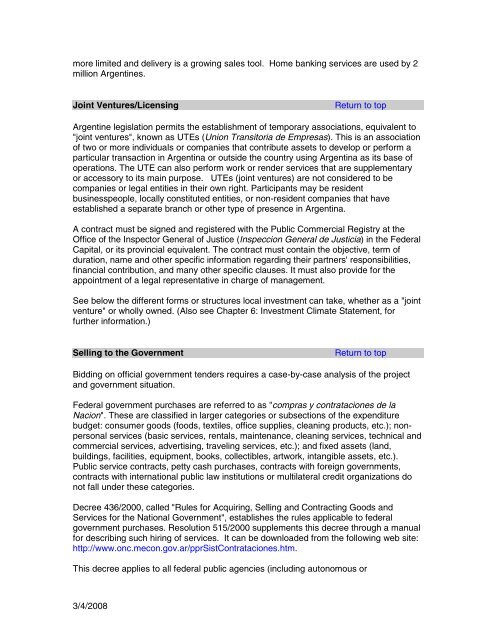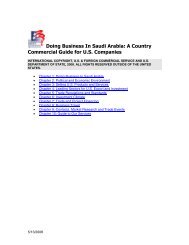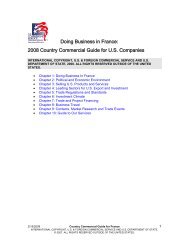Create successful ePaper yourself
Turn your PDF publications into a flip-book with our unique Google optimized e-Paper software.
more limited and delivery is a growing sales tool. Home banking services are used by 2<br />
million Argentines.<br />
Joint Ventures/Licensing Return to top<br />
Argentine legislation permits the establishment of temporary associations, equivalent to<br />
"joint ventures", known as UTEs (Union Transitoria de Empresas). This is an association<br />
of two or more individuals or companies that contribute assets to develop or perform a<br />
particular transaction in <strong>Argentina</strong> or outside the country using <strong>Argentina</strong> as its base of<br />
operations. The UTE can also perform work or render services that are supplementary<br />
or accessory to its main purpose. UTEs (joint ventures) are not considered to be<br />
companies or legal entities in their own right. Participants may be resident<br />
businesspeople, locally constituted entities, or non-resident companies that have<br />
established a separate branch or other type of presence in <strong>Argentina</strong>.<br />
A contract must be signed and registered with the Public Commercial Registry at the<br />
Office of the <strong>In</strong>spector General of Justice (<strong>In</strong>speccion General de Justicia) in the Federal<br />
Capital, or its provincial equivalent. The contract must contain the objective, term of<br />
duration, name and other specific information regarding their partners' responsibilities,<br />
financial contribution, and many other specific clauses. It must also provide for the<br />
appointment of a legal representative in charge of management.<br />
See below the different forms or structures local investment can take, whether as a "joint<br />
venture" or wholly owned. (Also see Chapter 6: <strong>In</strong>vestment Climate Statement, for<br />
further information.)<br />
Selling to the Government Return to top<br />
Bidding on official government tenders requires a case-by-case analysis of the project<br />
and government situation.<br />
Federal government purchases are referred to as "compras y contrataciones de la<br />
Nacion". These are classified in larger categories or subsections of the expenditure<br />
budget: consumer goods (foods, textiles, office supplies, cleaning products, etc.); nonpersonal<br />
services (basic services, rentals, maintenance, cleaning services, technical and<br />
commercial services, advertising, traveling services, etc.); and fixed assets (land,<br />
buildings, facilities, equipment, books, collectibles, artwork, intangible assets, etc.).<br />
Public service contracts, petty cash purchases, contracts with foreign governments,<br />
contracts with international public law institutions or multilateral credit organizations do<br />
not fall under these categories.<br />
Decree 436/2000, called "Rules for Acquiring, Selling and Contracting Goods and<br />
Services for the National Government", establishes the rules applicable to federal<br />
government purchases. Resolution 515/2000 supplements this decree through a manual<br />
for describing such hiring of services. It can be downloaded from the following web site:<br />
http://www.onc.mecon.gov.ar/pprSistContrataciones.htm.<br />
This decree applies to all federal public agencies (including autonomous or<br />
3/4/2008












